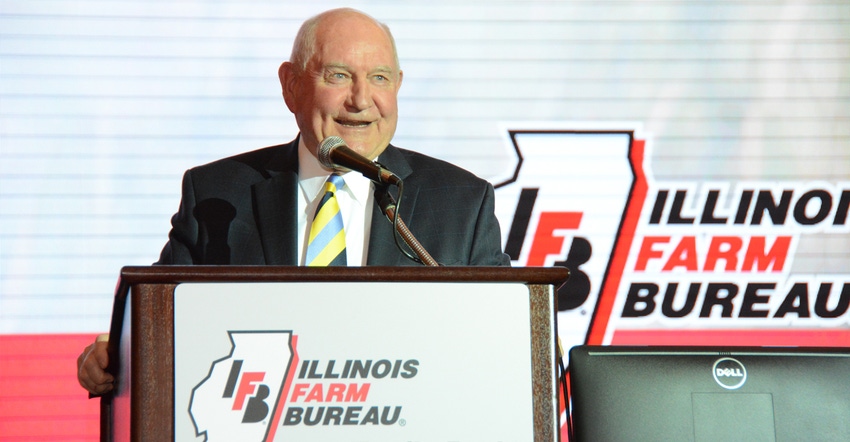
When USDA Secretary Sonny Perdue addressed the delegate session of the Illinois Farm Bureau on Dec. 3, he didn’t mince words on what President Donald Trump’s negotiations with Chinese leader Xi Jinping means to the heartland.
“We want them to start buying our stuff and stop stealing our stuff,” he said, to much applause from several hundred IFB members. “That’s really what it’s all about.”
Perdue said he was excited about the weekend’s trade developments, where Trump agreed not to hike tariffs on $200 billion worth of goods to 25% on Jan. 1, leaving them at 10%. And China agreed to purchase a “very substantial” amount of agriculture, energy and industrial goods, including soybeans, beef, oranges, pistachios and red wine.
Farmers will be a very BIG and FAST beneficiary of our deal with China. They intend to start purchasing agricultural product immediately. We make the finest and cleanest product in the World, and that is what China wants. Farmers, I LOVE YOU!
— Donald J. Trump (@realDonaldTrump) December 3, 2018
“It sounds very promising,” Perdue said. Yet it became clear Dec. 3 that China’s statement about the deal did not mention the purchase of U.S. agricultural products.
“In dealing with the Chinese, it’s never over till it’s over. As farmers, you know it’s not what you think you’re gonna make; it’s what you take to the elevator after that,” Perdue said.
Perdue repeatedly emphasized that U.S. negotiations regarding China’s way of conducting business were about more than just tariffs, referring to biotechnology and intellectual property transfer “through theft or forced transfer.” He said retaliatory tariffs have been extremely harmful to producers and expects the second launch of the Market Facilitation Program to be out by the end of the week or early next week.
Regarding news that Trump and Canadian and Mexican leaders signed the USMCA trade agreement the previous week, Perdue noted that in nearly every instance, U.S. farmers’ trade situation was improved. They were not able to secure provisions for fresh fruit and vegetable farmers in the southern U.S. but solidified markets with both countries over the next several years.
“We didn’t get everything we wanted; that’s what negotiations are all about. But by and large, we’re a whole lot better off than we were with the original NAFTA,” Perdue noted, calling on farmers to contact their members of Congress and encourage them to ratify the agreement.
Perdue said he was proud of the agriculture community over the last several months for giving the president the benefit of the doubt on trade negotiations.
“On behalf of the president, I’m going to thank you all in agriculture for having born the brunt of these retaliatory tariffs, and for understanding the long game,” Perdue said. “I think it’s because you’re people of the land and you understand you can’t plant corn in August and harvest in October. You know you’ve got to do things in order.”
Farm bill?
Perdue reported that farm bill discussions will be delayed following the death of President George H.W. Bush, but that farm bill leaders would use that time to hammer out more details in the farm bill. He still hopes to see the bill early next week.
He noted the Republican administration didn’t get everything in the farm bill that they wanted, though mostly on the nutrition side. Perdue said the president pushed hard to solidify work rules for the $70 billion supplemental nutrition assistance program. He noted that 17 million people were on food stamps prior to the recession, a number that peaked at 40 million during the recession, and is today just under 40 million.
Given unemployment is under 4%, the administration believes states are abusing the waiver process that was put in place during the recession. Instead, the administration says food stamps should be for short-term use during an emergency situation like loss of a job or a health crisis.
“If you’re an able-bodied working adult without dependents, there should be a limited time to be on food stamps,” he said.
The Republicans didn’t have the necessary votes in the Senate to secure those restrictions, but Perdue said they believe USDA can adopt regulatory measures that will “high-jump those waivers to put people back to work.” Look for an announcement soon after the farm bill is released, he added.
They also pushed for forestry provisions that would have allowed more proactive pre-emptive work to be done managing forestlands. “Environmentalists pushed back, and we were not able to get that,” Perdue said.
On the crops side, farmers will find more flexibility with Agricultural Risk Coverage and Price Loss Coverage programs, and the option to update annual production history, reflecting increasing yields. Crop insurance will be preserved and conservation measures, including Environmental Quality Incentives Program, will be preserved and possibly enhanced.
Perdue also predicts more money for trade promotion, in addition to Market Facilitation Program dollars, to help build markets.
He emphasized the need to build markets beyond China, naming India, Pakistan, Indonesia, Malaysia, Thailand, Vietnam and more. “We’re trying to develop markets that will help us so we’re not held hostage to one major customer, as we’ve been this year,” Perdue said.
About the Author(s)
You May Also Like






